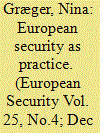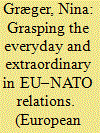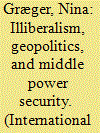|
|
|
Sort Order |
|
|
|
Items / Page
|
|
|
|
|
|
|
| Srl | Item |
| 1 |
ID:
148317


|
|
|
|
|
| Summary/Abstract |
European security is at a critical juncture and many have called for a more coherent and efficient response, involving both the EU and NATO. However, the primary tool for EU–NATO cooperation, “Berlin Plus”, has been stuck in a political quagmire since the mid-2000s, making a lot of scholars to conclude that this cooperation is obsolete and outdated. This article is challenging this view by analysing a range of informal but regular interaction patterns that have emerged. Using practice theory, it sheds new light on and explores how EU and NATO staff at all levels engage in informal practices on various sites in headquarters in Brussels and in field operations. A study of EU–NATO cooperation as practice focuses on the everyday, patterned production of security as well as what makes action possible, such as (tacit) practical knowledge and shared “background” knowledge (education, training, and experience). The article also discusses the extent to which shared repertoires of practice may evolve into loose communities of practice that cut across organisational and professional boundaries.
|
|
|
|
|
|
|
|
|
|
|
|
|
|
|
|
| 2 |
ID:
154463


|
|
|
|
|
| Summary/Abstract |
Much scholarly work seeking to explain the EU–NATO relationship emphasises conflicting national or institutional interests, strategic individuals, and operational inefficiencies and overlaps. This article offers an alternative account of how both the everyday and the extraordinary in EU–NATO security cooperation can be identified and analysed by applying practice theory. Despite the “Cyprus issue”, which has left EU–NATO cooperation under Berlin Plus in political stalemate, regular interaction involving civilian and military EU and NATO staff at all levels and various sites has increased over the past decade. The article shows how a practice take is well suited to uncover the practical logic at work in these, predominantly informal EU–NATO encounters; how practices are established, enacted, and also abrupted. Furthermore, it discusses how shared “background conditions” – skills and experience – facilitate practices, learning, and community-building but also competition and rivalry.
|
|
|
|
|
|
|
|
|
|
|
|
|
|
|
|
| 3 |
ID:
164368


|
|
|
|
|
| Summary/Abstract |
Middle powers have played a key role in supporting global governance, a rules-based order, and human rights norms. Apart from conveying and effectuating global solidarity and responsibility, multilateral cooperation has been an arena where middle powers seek protection and leverage relatively modest power to greater effect, sometimes as “helpful fixers” to great powers. This article argues that geopolitical revival and the contestation of the liberal order are challenging middle powers' traditional sheltering policies, based on empirical evidence from the Norwegian case. First, the weakening of multilateral organizations is making middle powers more vulnerable to great power rivalry and geopolitics, and Norway's relationship with Russia is particularly pointed. Second, existing shelters such as NATO and bilateral cooperation with the US are negatively affected by the latter's anti-liberal foreign policies, making looser sheltering frameworks important supplements. While Norway's and other middle powers' traditional policies within the “soft power” belt may continue, “doing good” may become less prioritized, due to the need for security.
|
|
|
|
|
|
|
|
|
|
|
|
|
|
|
|
|
|
|
|
|